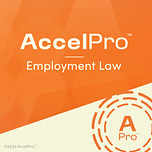Welcome to AccelPro Employment Law, where we provide expert interviews and coaching to accelerate your professional development. Today we’re going to continue talking about our country’s employment at-will regime and the power imbalance it creates between employers and employees.
Our guest is Cynthia Estlund, a leading scholar of labor and employment law and workplace governance. Currently a professor at NYU’s Law School, she has also taught at Harvard, Columbia and the University of Texas.
We dove so deep on this issue that we turned it into two episodes. This is part two, in which we explore ways to rebalance that imbalance of power and search for possible solutions, as U.S. workers lag behind the developed world in terms of power in the workplace.
Businesses could be proactive and cede power in the name of a better workplace, which could improve productivity or profits or both. Or, Congress could pass a law requiring businesses to treat employees better. “The problem is it’s a high-risk strategy because Congress could do something much worse than what we have now from the standpoint of employees,” Estlund says. “So we muddle through.”
Be sure to check out part one, in which we break down what employment at-will means for employees and employers. The supplemental materials and episode transcript are available below.
AccelPro’s expert interviews and coaching accelerate your professional development. Join AccelPro Employment Law now for a free trial of everything we offer to members.
Interview References:
Cynthia Estlund’s NYU Law faculty page
4:33 | International Finance Corporation; World Bank. (2007). Doing Business 2008: Comparing Regulation in 178 Economies.
4:34 | Adams, Zoe and Bishop, Louise and Deakin, Simon F. and Fenwick, Colin and Martinsson Garzelli, Sara and Rusconi, Giudy. (2018). The Economic Significance of Laws Relating to Employment Protection and Different Forms of Employment: Analysis of a Panel of 117 Countries, 1990-2013. University of Cambridge Faculty of Law Research Paper No. 36/2018, European Corporate Governance Institute (ECGI) - Law Working Paper No. 406/2018.
13:27 | Wrongful Discharge Law, N.Y.C. Admin. Code §§ 20-1271 to 20-1275. (2021).
17:23 | Krawiec ,Kimberly D. (2003). Cosmetic Compliance and the Failure of Negotiated Governance. Washington University Law Review, 81(2).
TRANSCRIPT
I. REBALANCE THE IMBALANCE OF POWER
Matt Crossman, Host: How do we rebalance this imbalance of power between employers and employees?
Cynthia Estlund: Wow, that’s a huge question.
MC: Do you have six hours to answer that?
CE: Right. You could say that is my lifelong research agenda in a sense. Everything I’ve written with one exception really is about work. It’s about regulating work, it’s about workers’ rights, and it’s all over the place—including employment at-will and its exceptions. And the other ways that employers exercise power over employees, for example, by requiring them to sign a non-compete agreement that constrains the employee’s ability to actually go out there and find another job without moving across the country.
I’ve written about a lot of different things, and in a sense, almost all of them are about the power that employers exercise over workers. Most workers, most of the time, not all workers, all of the time. Some workers have bargaining power, absolutely. The higher up you go, the more you start looking like the talent that the employer has to chase.
That’s a good position to be in, right? But people who have, let’s call them ordinary skills, who are competing both with a lot of other people and with machines, they don’t have a ton of power. And the law weighs in on their side, both by giving them the right to join together and form a union and bargain collectively with their employer and by giving them some rights to minimum wage, right to overtime compensation, right to safe workplace, all that.
And so, yes, in a sense that does describe what I think I and most labor and employment scholars sort of see as the nature of our field. And not everyone in the field in the practice would see it that way. There are more lawyers that represent employers out there than workers and unions.
But it is true that in the legal academy, there’s a very strong pro-employee, pro-union tilt to why people go into the academy and the kind of work they do. No question about that. You have to be able to step back and be fair-minded and consider legitimate interests, which there clearly are on the other side. But in terms of why did you come into this field, it’s often having to do with the imbalance of power and how to fix that if you can.
MC: I perceive a slight light at the end of this dark tunnel. Maybe. You cite a couple of massive studies, one from the World Bank and one from Cambridge, that suggest, they don’t prove, but they suggest a sway in public opinion on this topic.
For years it was the broad consensus that too much protection for the employee was, by and large, not good for business, but maybe that’s changing. Maybe there’s some research that suggests, again, it doesn’t prove, that employee protection is a good long-term idea. What is happening there and what do employers and attorneys need to know?
CE: So the research that you’re talking about is not about public opinion, it’s about economic research on the actual impact of employment protection laws, which as I mentioned, are pervasive throughout the world. But they’re different in different countries.
Listen to this episode with a 7-day free trial
Subscribe to AccelPro | Employment & Labor Law to listen to this post and get 7 days of free access to the full post archives.












